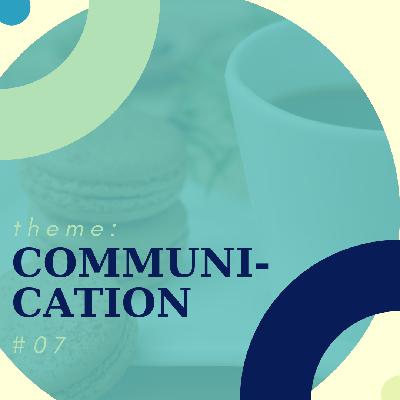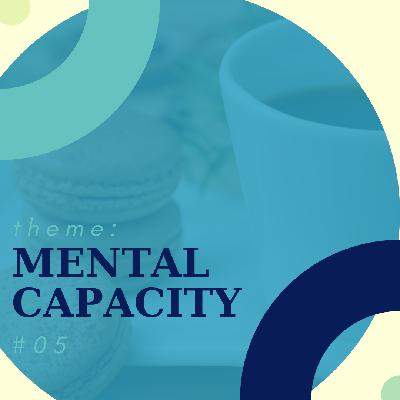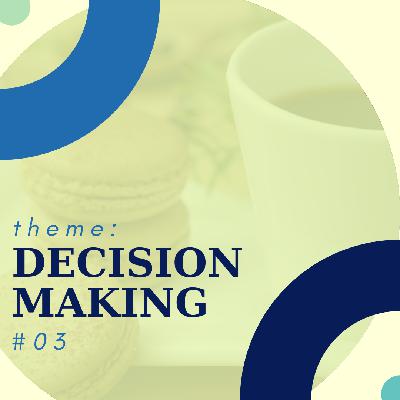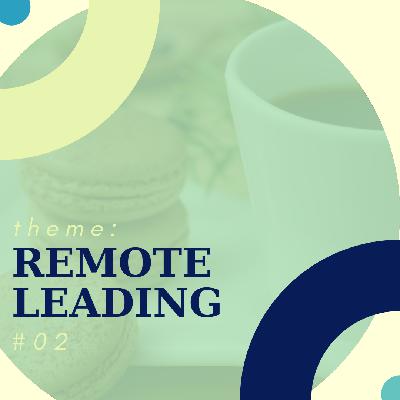Discover F+Z Reality's
F+Z Reality's

21 Episodes
Reverse
Meetings can be difficult in both remote and face-to-face settings. From staying focused, being engaged, arranging your thoughts & reading people’s expressions to managing silent situations. This episode was one of our favourite topics - communication and how to make others hear us. Although the conversation took a different direction than expected, our curiosity led us to focus on in-person and remote meetings. Here are a few highlights from our latest episode:We opened up this episode with a question ‘do other people listen to you?’ and ‘how often they don't?’ How can we hold onto others’ attention during meetings? Here Zuzanna shared about practising deep listening and the power of asking questions. Almost all of us will experience “awkward silence” when the presenter asked for feedback or a question. How do we maintain our composure and confidence then? Lastly, we shared and agreed that everyone in the organization or team, their voices and opinions matter and must be given a chance to be heard. This episode left both of us with plenty of thoughts to reflect on. What is emerging for you from our discussion?You can reach us at fandzreality@gmail com.
Listen to full episode :
This is a short 5mins summary for listeners who are on the go.Remote work has certainly created opportunities for us, like allowing many workers to work from home and spend more quality time with family, and widening the talent pool for many employers. However, remote working also exposes social risks. Workers are experiencing burnout and loneliness. In this episode 5, we reflected on remote burnout and shared a few tips on how to deal with it. Here are a few highlights from our latest episode:We reflected on how remote work or work from home had provided us with flexibility and empowerment. We are able to spend more family time while still keeping the same productivity output. While some thrive and live their dream life, others realise that it is harder than ever for them to put a hard stop on working and that work-life balance has never been further away and eventually resulted in work burnout. A few tips on dealing with remote burnout – scheduling intentional breaks to have coffee or go for a walk, pantry talk with colleagues virtually, listening to your body, & creating a culture of empathy. Addressing remote burnout or achieving a healthy work-life environment should start with the leader. This episode left both of us with plenty of thoughts to reflect on. What is emerging for you from our discussion?You can reach us at fandzreality@gmail com.
Listen to full episode :
Remote work has certainly created opportunities for us, like allowing many workers to work from home and spend more quality time with family, and widening the talent pool for many employers. However, remote working also exposes social risks. Workers are experiencing burnout and loneliness. In this episode 5, we reflected on remote burnout and shared a few tips on how to deal with it. Here are a few highlights from our latest episode:We reflected on how remote work or work from home had provided us with flexibility and empowerment. We are able to spend more family time while still keeping the same productivity output. While some thrive and live their dream life, others realise that it is harder than ever for them to put a hard stop on working and that work-life balance has never been further away and eventually resulted in work burnout. A few tips on dealing with remote burnout – scheduling intentional breaks to have coffee or go for a walk, pantry talk with colleagues virtually, listening to your body, & creating a culture of empathy. Addressing remote burnout or achieving a healthy work-life environment should start with the leader. This episode left both of us with plenty of thoughts to reflect on. What is emerging for you from our discussion?You can reach us at fandzreality@gmail com.
Listen to full episode :
This is a short 5mins summary for listeners who are on the go.According to Maslow, if you want to get to the top of the pyramid and fulfil your full potential, you’ve got to build a solid base first. There are four building blocks, Physical Security, Emotional Security, Environment, & Mindset. Self-control is one of the skills that overlap the building blocks and a skill that develops over time. Self-control refers to your ability to manage your behavior in order to achieve goals, improve positive outcomes, and avoid negative consequences. Self-control is an important skill that allows us to regulate behavior in order to achieve our long-term goals.In this episode 4, we discussed how to bring one’s full potential to work and how to encourage others to fully show up, and one of the skills that you need is self-control. What are the benefits of having self-control?Can we control our self-control?Improving cultural awareness with self-controlWe wrapped up our discussion with an agreement that to encourage others to bring their full selves and potential at work, it has to start with awareness, both social and self. It is also equally important to share our weaknesses and faults.This episode left both of us with plenty of thoughts to reflect on. What is emerging for you from our discussion?You can reach us at fandzreality@gmail com.
Listen to full episode :
Episodes RSS
This is a short 5mins summary for listeners who are on the go. The classic overthinking definition is, “to think about something too much or for too long.” It might feel like you’re the only one lying awake at night, dwelling on a decision you made earlier that day or worrying about tomorrow’s to-do list. But you’re not alone—research suggests that seventy-three percent of 25- to 35-year-olds overthink, along with fifty-two percent of people ages 45 to 55[1].In this episode 3, we explored the topic of overthinking and looking at it from many different angles and pondered on its benefits and the downside of it. How far should we overthink and when to stop.What is the right amount of overthinkingWhat is a better way to measure to know when it is enough of the thinking before one gets into overthinking?Looking at ways to get away from overthinkingIs it wrong to overthink our futureWhile it’s human nature to think things through when making a decision or evaluating a situation, it becomes overthinking when you can’t get out of your own head. It happens to all of us at some point in our lives – we all experience events that cause us worry or stress.Thank you so much everyone for listening, we would love to hear from you. What is your view on the smallest actions lead to long-term rewards? Have you ever taken such an approach?You can reach us at fandzreality@gmail com.
Listen to full episode :
The classic overthinking definition is, “to think about something too much or for too long.” It might feel like you’re the only one lying awake at night, dwelling on a decision you made earlier that day or worrying about tomorrow’s to-do list. But you’re not alone—research suggests that seventy-three percent of 25- to 35-year-olds overthink, along with fifty-two percent of people ages 45 to 55[1].In this episode 3, we explored the topic of overthinking and looking at it from many different angles and pondered on its benefits and the downside of it. How far should we overthink and when to stop.What is the right amount of overthinkingWhat is a better way to measure to know when it is enough of the thinking before one gets into overthinking?Looking at ways to get away from overthinkingIs it wrong to overthink our futureWhile it’s human nature to think things through when making a decision or evaluating a situation, it becomes overthinking when you can’t get out of your own head. It happens to all of us at some point in our lives – we all experience events that cause us worry or stress.Thank you so much everyone for listening, we would love to hear from you. What is your view on the smallest actions lead to long-term rewards? Have you ever taken such an approach?You can reach us at fandzreality@gmail com.
Listen to full episode :
A short 5 min summary for listeners who are on the go. Linda Kaplan Thaler and Robin Koval argue in their book, The Power of Small: Why Little Things Make all the Difference, that bigger is not always better. In fact, these authors challenge all of us that our smallest actions, words, and gestures often lead to our greatest long-term rewards and outcomes.In this episode 2, we had a conversation about the impact of small measures and how they impacted our lives. How we can adopt the Pareto Principle of 80/20. For example, it is not uncommon to see people who appear to be busy all day long but seem to accomplish very little. This is almost always because they are busy working on tasks that are of low value while they are procrastinating on the one or two activities that could make a real difference to their companies and to their careers.When it comes to personal relationships, limiting beliefs can affect everything from culture to overall performance and efficiency. Limiting beliefs can lead us to be passive and to ignore or overlook small measures, small steps. A small change to your routine and habit can improve the way you look at things and well-being and staying healthy.Thank you so much everyone for listening, we would love to hear from you. What is your view on the smallest actions lead to long-term rewards? Have you ever taken such an approach?You can reach us at fandzreality@gmail com.
Listen to full episode :
In Season 2, we decided to tweak our approach. We understand that time is precious to some of our listeners and we feel you. With that in mind, we are going to create a short 5 mins podcast to give highlights of each episode.In episode 1, we tapped into what it means to be present, living in the moment and connected it with multitasking and critical thinking! Being present is a way for you to absorb and experience whatever things are around you, for example, paying your full attention to people or surroundings in a new place or with a new work role, while Living in the moment is the ability to make decisions that come with certain risks for a benefit or to achieve something.Here are a few highlights from our conversation:You can be present with others, as well as with yourself. For example, try meditation or self-reflection, perhaps every morning one wishes to be present holistically with the environment, your mind and your body - to notice one’s feelings, thoughts, needs, to reflect what is lacking or what needs to be pursued.Then we had a look into multitasking - if it is even possible, and what are the consequences and cost of multitasking, i.e., losing focus and concentration, more time required to perform certain tasks, lower efficiency, and productivity.Next, we wanted to solve the mystery if one can practise critical thinking while being present? Is it possible to fully immerse into the present moment and analyse, complete and be critical about a certain task?We deepen the conflict's context even more. Being present during a conflict situation is called sitting in the fire, as it is challenging and uncomfortable. Conflicts are situations in which most people would do everything that they can not to be present in the moment, to escape that moment.We ended up sharing our key takeaways from this conversation. There are many beliefs around what is being in the moment and how it's not possible in many circumstances. And maybe it is possible at any given moment, it doesn’t mean it is always needed or is best for us. So, let’s always pick what serves us the most. At the end of the day, it is on us as individuals to be able to activate what is needed at a certain time, place and within a certain audience.Thank you so much everyone for listening, we would love to hear from you. What is your view on being present? When do you like being present and when do you think it's a challenge for you? You can reach us at fandzreality@gmail com.
Listen to full episode :
Do you stretch your mind regularly?There are many benefits of stretching, like improving flexibility or minimizing risks of injuries. The same applies to our minds - they need regular stretching to stay healthy, flexible and to serve us for many years!So how can one stretch her/his mind? 🤔That is one of the reasons that Faizal and I created the F+Z Reality's Podcast! 🎧🧠And we have some great news!Season 2 of F+Z reality will be released any day now!New website, new topics and new amazing visual identity!But before we dive into the second season, I prepared a short recap of the first season for you!👉🏽 listen 🎧 or read 👇🏽 and enjoy 💚In episode 1, we talked about New Year's resolutions. We shared and explored our experiences with setting goals, intentions, directions or challenges for a different new year or executing projects. As we dug into various strategies and tricks to get to your goals.In episode 2, we decided to have a look at the topic of remote trust. At first, the remote work was supposed to last just for a few weeks. And it is still our new reality. We share experience, observations and knowledge around building trust in remote settings!In episode 3, we had an insightful conversation on decision making. We shared some reflections and had a lot of fun while answering questions like What makes a bad decision a bad decision? And why is selecting a good yogurt important for your future?In episode 4, we discussed the essentials of communication. We focused on getting rid of misunderstandings and miscommunications and making the whole process easier and lighter!In episode 5, we talked about differences between push and pull mindsets! And we both agreed that the pull mindset is the one we would like to have more of in our lives!In episode 6, we discussed our perspectives of working with people. Since our preferences seemed as total opposites we discussed the ups and lows of being a lone wolf or working in a pack.In episode 7, we decided to have a look at what success is to us. In this, we drifted towards discussion about our self-relationships and how these impact our success (and a definition of it!).In episode 8, we concluded the first season with a discussion about habits. Building new habits or nourishing old ones — both need an evaluation from time to time. During our conversation, we created for you a brief instruction on how you can evaluate your habits.I feel like all these topics are still relevant, so go ahead and re-listen to any of those if a topic caught your attention!And watch out for the release of season 2 with more stretching for your mind!
Listen to full episode :
Linda Kaplan Thaler and Robin Koval argue in their book, The Power of Small: Why Little Things Make all the Difference, that bigger is not always better. In fact, these authors challenge all of us that our smallest actions, words, and gestures often lead to our greatest long-term rewards and outcomes.In this episode 2, we had a conversation about the impact of small measures and how they impacted our lives. How we can adopt the Pareto Principle of 80/20. For example, it is not uncommon to see people who appear to be busy all day long but seem to accomplish very little. This is almost always because they are busy working on tasks that are of low value while they are procrastinating on the one or two activities that could make a real difference to their companies and to their careers.When it comes to personal relationships, limiting beliefs can affect everything from culture to overall performance and efficiency. Limiting beliefs can lead us to be passive and to ignore or overlook small measures, small steps. A small change to your routine and habit can improve the way you look at things and well-being and staying healthy.Thank you so much everyone for listening, we would love to hear from you. What is your view on the smallest actions lead to long-term rewards? Have you ever taken such an approach?You can reach us at fandzreality@gmail com.
Listen to full episode :
In episode 1, we tapped into what it means to be present, living in the moment and connected it with multitasking and critical thinking! Being present is a way for you to absorb and experience whatever things are around you, for example, paying our full attention to people or surroundings in a new place or with a new work role, while Living in the moment is the ability to make decisions that come with certain risks for a benefit or to achieve something.Here are a few highlights from our conversation:You can be present with others, as well as with yourself. For example, try meditation or self-reflection, perhaps every morning one wishes to be present holistically with the environment, your mind and your body - to notice one’s feelings, thoughts, needs, to reflect what is lacking or what needs to be pursued.Then we had a look into multitasking - if it is even possible, and what are the consequences and cost of multitasking, i.e., losing focus and concentration, more time required to perform certain tasks, lower efficiency, and productivity.Next, we wanted to solve the mystery if one can practise critical thinking while being present? Is it possible to fully immerse into the present moment and analyse, complete and be critical about a certain task?We deepen the conflict's context even more. Being present during a conflict situation is called sitting in the fire, as it is challenging and uncomfortable. Conflicts are situations in which most people would do everything that they can not to be present in the moment, to escape that moment.We ended up sharing our key takeaways from this conversation. There are many beliefs around what is being in the moment and how it's not possible in many circumstances. And maybe it is possible at any given moment, it doesn’t mean it is always needed or is best for us. So, let’s always pick what serves us the most. At the end of the day, it is on us as individuals to be able to activate what is needed at a certain time, place and within a certain audience.Thank you so much everyone for listening, we would love to hear from you. What is your view on being present? When do you like being present and when do you think it's a challenge for you? You can reach us at fandzreality@gmail com.
Listen to full episode :
We all know that it takes time and effort to develop habits. With the right habits, you're more efficient, effective, and strategic about the thoughts and actions that lead you towards your goals. However, it is no surprise that many people give up too early while the rest don't even notice their habits at all.So, with all this talk about habits, you might be wondering: What is really in it for you? And why should you bother with it in the first place?- How do your habits impact your essence? - Are your habits the opposite of being yourself? - Do habits equal having a highly structured life? - What about having a habit of being spontaneous? - Do you need to be self-disciplined to create new habits? - When do you rather be spontaneous rather than planned and organised?, and- How do you evaluate your habits?We would like to think of it this way, habits come in handy because habits are activities that have become automatic, consistent, and eventually, less difficult for you.
Listen to full episode :
Self-relationship is the foundation of everything else, including achieving success. And, it is the most important relationship in life. Anne Sweeney said that we should define success on our own terms, achieve it by our own rules, and build a life that we are proud to live. So, what does success mean to you, and how often do you measure your success with external ratings? Many people come and go in our lives. We move, change jobs or countries, and the only person who is always there with you, is you. Since there is no way of getting rid of yourself, what about investing in your relationship with yourself? We care for so many relationships and partnerships, at home and at work. It is high time to start truly caring for our self-relationship, especially when there will probably be many years of struggles, fights, and criticism to repair and redress.In this episode, we guide you through the value of self-relationship in the context of your success. We are addressing questions like: - What success means to you? - Where is your definition of success coming from? - How often are you redefining or reevaluating your definition of success? - How do you recognize that it is high time for reevaluation? - How strong is your self-relationship? - How does it impact your success, your life and you? - What are some tricks to strengthen your self-relationship?
Listen to full episode :
Are you a team player or you rather work alone?Sometimes, it’s so much better to work alone–and in a private environment, when we need that space and privacy to stay focus and get the tasks done. On the other hand, working as a team pays off handsomely, especially if you are in a small team with good dynamics and with diverse strengths. You can ride on the team's energy to remain committed and motivated, and the hard things will seem easier. In this Ep 06, we talked about how we can find the balance and in what kind of situation that it is better to work alone or as a team. Here are some of the questions to think about:- Do you prefer to work alone or as a team? - Are you a team player? - Which tasks are better for alone work? - When is it better to work as a team? - What is your signal not to get disturbed by others? - How to compensate for remote working?In this current situation that we are in, choosing one over the other doesn't seem to be our option. We may have to work independently and still be a collaborative team player.
Listen to full episode :
Is it possible to achieve a sense of satisfaction and fulfilment in life?Each of us has the potential to do magnificent things, but the problem is, we spend most of our time trying to control how we act, what we do and what other people think of us. This is inevitable. It is ingrained in us based on our life experiences. In this Episode 5, we talked about the difference between push and pull mindset and some of the key benefits of pull mindset. To get you started, slow down, take a pause and ask yourselves the following questions. - How hard is your life right now? - How hard was your life during the most successful period? Does life get harder with success?- How hard was life during the happiest period? Does life get harder with happiness? - What is a push mindset? What is a pull mindset? - When and in which circumstances we are more inclined towards a push or pull mindset? And how can it be beneficial for us? - What surfing has to do with happiness? How to maintain happiness? - How to get what you want without ending up drained? - How to create your flow? - What impact pull mindset has on your decision-making process? - And what is the effect on your relationship with yourself?Finding ways to generate our flow may help us experience a greater sense of wellbeing, satisfaction and fulfilment.
Listen to full episode :
How to read minds by listening?Misunderstandings are a common phenomenon in our daily life. Many people dream about being able to read someone else's mind so that it’s easier to convey a message and to get a job done. One of the factors that lead to misunderstanding is 'assumption'. Assumption not only sabotage effective communication and listening, but can also lead everyone down the unintended path. So here are some questions that we can ask ourselves and reflect on. Why should we care about communication? Why would anyone want others to read their minds? Did we stop communicating and start assuming? What is good communication? How to become good at active listening and how active listening can prevent misunderstandings from happening? In which ways one can develop? How to choose the right words to communicate with others? What is your message really about? How can we secure body-language-aspect of communication within a virtual setting? Why can some people communicate better just in audio? And what has a vegan sandwich to do with all of that?
Listen to full episode :
Why is decision making such a difficult process? Decision making is an integral part of our daily life and also applies to organizations and management. It is one of the key factors that will pave the way for your success or failure, and every decision you make will have a compounding effect - a seed planted for the future. Decision making is a continuous process of analyzing and considering various alternatives in various situations. And more often than not, we are stuck between emotional vs rational decision-making. What type of fear is present during the decision-making process? Which factors contributing to decision making are crucial? Which decisions are good and which ones are bad? What makes a bad decision a bad decision? What needs to happen to call a decision “bad” after a certain time? Why is deciding between different job offers tough and complicated? Does every decision impact our future? How long should one stay in a workplace before being able to make an educated decision of leaving it? And why is selecting a good yogurt important for your future?
Listen to full episode :
What comes to your mind when you hear ‘remote trust’?Gone were the days when we can hop onto a plane and off to another city or country to attend meetings with clients, meet up with our local team, or for business development purposes.In the ‘new normal’, we need to be adaptable and create a collaborative, productive, efficient and trustworthy team while working remotely. Here are the questions that you might be asking:- What are the ethics of remote working? - What is the code for virtual meetings? - What is allowed in the virtual setting? And what is not welcomed? - What are some essential tips for building remote trust? - What can you do as a leader? - How to manage a team purely remotely? - How to ensure the security of your mental health in a virtual work setting? - And what does a passport photo have to do with it?
Listen to full episode :
Why is it difficult to stick to your new year’s resolutions (NYR)? If not NYR, then what?Intentions, directions, challenges - How to select what works for you? What would be different from having to have yourself as your accountability buddy? What are the steps to becoming a best friend to yourself? How to understand and distinguish our needs from our wants? Is taking a deep breath a good habit to deal with frustration? What is a good little trick if you get triggered? How do you connect to yourself in only 2 minutes? Are NYR important? For who do NYR work? What are 2 or 3 things that should be present on your NYR list?
Listen to full episode :
This is a pre-episode where we are introducing ourselves, explaining what is F+Z Reality, and inviting you to join us. So who are we? Faizal is an experienced program manager and, who also helps others to discover their personal mission. And, Zuzanna is a communication coach working with teams and helping them transition from being a group of talented people to becoming a real team. Tune in to get to know us better, to hear the story of this podcast, to get your mind stretched and much more!
Listen to full episode :
























